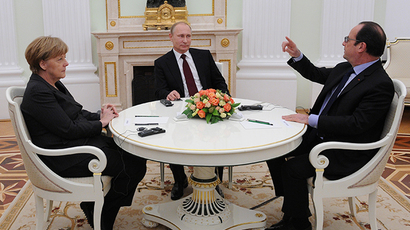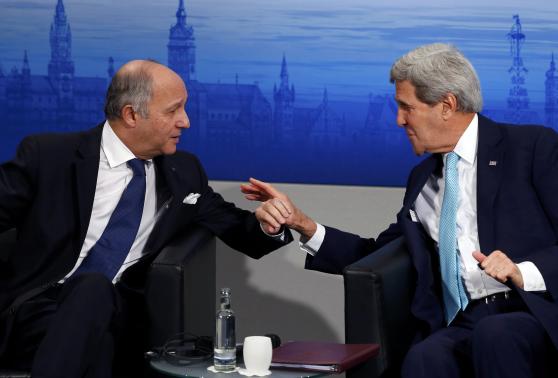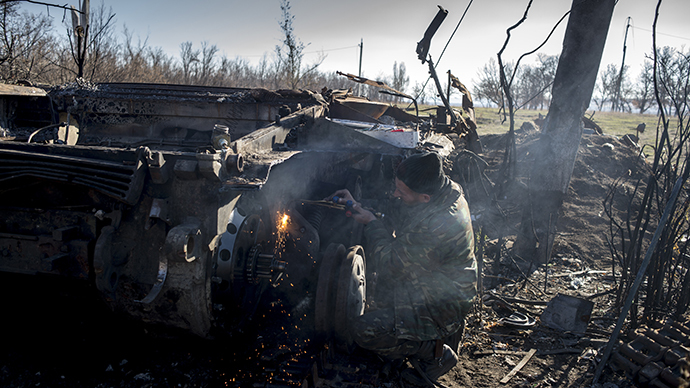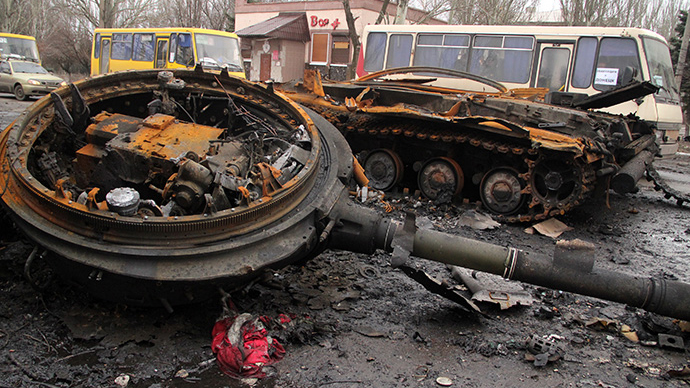www.aljazeerah.info
News, February 2015
Archives
Mission & Name
Conflict Terminology
Editorials
Gaza Holocaust
Gulf War
Isdood
Islam
News
News Photos
Opinion Editorials
US Foreign Policy (Dr. El-Najjar's Articles)
www.aljazeerah.info
|
Editorial Note: The following news reports are summaries from original sources. They may also include corrections of Arabic names and political terminology. Comments are in parentheses. |
Ukrainian Crisis May Escalate to Full Russian-NATO Confrontaion, After 50,000 Ukrainian Civil War Deaths Reported
February 8, 2015
 |
 |
| Russian President Vladimir Putin, Federal Chancellor of Germany Angela Merkel and President of France Francois Hollande, right, during a meeting in Kremlin February 6, 2015. (RIA Novosti / Michael Klimentyev) | US Secretary of State, John Kerry, and French Foreign Minister, Fabiyous, in Munich, February 8, 2015 |
 |
 |
| Ukrainian military vehicles and tanks burning after battles with Eastern regions rebels, February 8, 2015 |
Ukraine crisis:
Putin, Poroshenko, Hollande, Merkel voice plans for Minsk meeting
Russia TV, February 08, 2015 13:29
A 'Normandy Four' meeting may be held in the Belarus capital as early as Wednesday, the German government said, following a phone call between Vladimir Putin, Petro Poroshenko, Angela Merkel and Francois Hollande.
The leaders of Russia, Ukraine, France and Germany held a joint telephone call this morning, the German government says.
"In [the call] they worked further on a package of measures in the context of their efforts on a comprehensive settlement of the conflict in eastern Ukraine," Steffen Seibert, Germany’s government spokesperson, said in a statement.
"This work will be continued tomorrow in Berlin with the goal of holding a 'Normandy Format' summit on Wednesday in Minsk," he added.
Signatories of last year's Minsk deal, including representatives of the OSCE, Russia and Ukraine and rebel forces would join the meeting in Minsk.
Russia's President Vladimir Putin said the meeting will take place "if by then we manage to agree our positions, which we have been discussing very intensively in recent days." According to diplomatic sources, Moscow may be represented by Deputy Foreign Minister Grigory Karasin.
The plan was also confirmed by President Petro Poroshenko's press service who said the leaders hope the talks will lead to "a swift and unconditional” ceasefire on both sides.
The phone call follows Chancellor Angela Merkel and President Francois Hollande’s visit to Moscow, where they attempted to hammer out a peace plan with Vladimir Putin.
Their surprise visits to the capitals of Ukraine and Russia, with new peace proposals, were announced while US Secretary of State John Kerry was in Kiev, speaking of possible weapons supplies to Ukrainian government troops. Political analysts believe the dispute inside the US on whether to arm Ukraine could actually trigger the Franco-German peace initiative, because Europe is reluctant to have a full-blown war on its doorstep. The details of the Franco-German peace initiative have not been disclosed, though Francois Hollande said on Saturday the Franco-German peace initiative would feature a 50- to 70-kilometer demilitarized zone on each side of the current line dividing militia-held and Kiev-controlled territories.
Calling on Kiev to grant east Ukraine more powers, Hollande said the plan could be “one of the last chances” for peace in Ukraine.
Angela Merkel also ruled out the option of arming Ukrainian army as a possible solution to the crisis. "I understand the debate [on weapons supplies] but I believe that more weapons will not lead to the progress Ukraine needs. I really doubt that," she said.
The spokesman for the Russian president, Dmitry Peskov, would only describe the deal as “constructive.”
50,000 casualties in Ukraine: German intel says ‘official figures not credible’
Russia TV, February 08, 2015, 13:53
The German intelligence service estimates the real losses in the Ukrainian civil war at 50,000 dead (civilians and servicemen), which is nearly 10 times higher than reported by the Kiev authorities, German media report.
The information comes from a source in German intelligence, who spoke to the Frankfurter Allgemeine Sonntagszeitung (FAZ) newspaper.
“Germany’s special services estimate the probable number of deceased Ukrainian servicemen and civilians at up to 50,000 people. This figure is about 10 times higher than official data. Official figures are clearly too low and not credible,” the newspaper reported on Sunday, citing its source.
A militiaman of the People's Republic of Lugansk inspects a burnt-out Ukrainian tank in Novosvetlovka. (RIA Novosti / Valeriy Melnikov)
Just one day before the report was published, the Ukrainian president gave completely different numbers to the international community.
“The death toll for the Ukrainian soldiers defending land from the aggressor is now 1,432. Thousands of people, 5,638, have been killed since April [2014] and every single day the number of victims among the civilians is rising,” Petro Poroshenko said in his address to the 51st Munich Security Conference on Saturday.
The Ukrainian army is reported to be suffering its heaviest losses since the beginning of the conflict last spring. According to the Donetsk militia representative, Eduard Basurin, the Ukrainian army has lost 1,569 servicemen in just three weeks since restarting the offensive.
The situation on the battlefield is dire for the Ukrainian forces. Some 8,000 Ukrainian troops are believed to be surrounded near the village of Debaltsevo in Donbass. Militia units cut off the only road linking this pocket of land to Kiev-controlled territory.
Taking into account these heavy losses, Ukraine is set to call up as many military age Ukrainians as possible. The national military draft for 2015 is expected to see 100,000 people joining the army in three stages throughout the year.
The recruitment effort, coming amid intensified fighting in eastern Ukraine, is being met by a distinct lack of enthusiasm by potential soldiers.
Kerry denies split between U.S. and Europe on Russia policy
MUNICH Sun Feb 8, 2015 7:52am EST
(Reuters) -
US Secretary of State John Kerry denied on Sunday that a split has emerged between Washington and Europe over how to handle Russia, after leading U.S. senators sharply criticized Germany and other countries who oppose sending arms to the Ukraine military.
"Let me assure everybody there is no division, there is no split – I hear people trying to create one," Kerry told a security conference in Munich.
"We are united, we are working closely together, we all agree that this challenge will not end through military force. We are united in our diplomacy.”
(Reporting by Lesley Wroughton and Noah Barkin)
Leaders scramble to avert 'dramatic spiral' in Ukraine
By Noah Barkin and Lesley Wroughton
MUNICH Sun Feb 8, 2015 12:16pm EST
(Reuters) -
The leaders of Russia, Ukraine, Germany and France agreed to meet in Belarus on Wednesday to try to broker a peace deal for Ukraine amid escalating violence there and signs of cracks in the transatlantic consensus on confronting Vladimir Putin.
The four leaders held a call on Sunday, two days after Chancellor Angela Merkel and French President Francois Hollande traveled to Moscow for talks with Putin that produced no breakthrough in the nearly year-long conflict that has claimed over 5,000 lives.
After the call, Ukraine President Petro Poroshenko said progress had been made and that he was hopeful the meeting in Minsk would lead to a "swift and unconditional ceasefire" in eastern Ukraine, where pro-Russian separatists have stepped up a military offensive in recent weeks, seizing new territory.
A Ukraine military spokesman said on Sunday that intense fighting was continuing around the rail junction town of Debaltseve, with rebel fighters making repeated attempts to storm lines defended by government troops.
At a high-level security conference in Munich over the weekend, Merkel said it was uncertain whether further negotiations would lead to a deal with Putin but argued that all opportunities for a diplomatic solution should be pursued.
She came under sharp criticism from U.S. senators Lyndsey Graham and John McCain, both Republican hawks, for opposing the sending of defensive weapons to the Ukraine army to help it fight the separatists.
"The Ukrainians are being slaughtered and we're sending them blankets and meals," McCain said in Munich. "Blankets don't do well against Russian tanks."
U.S. Secretary of State John Kerry sought to play down the differences with Europe.
"Will we remain united? The answer is absolutely, positively, unequivocally we are united, we will remain united," Kerry told the conference on Sunday, describing any differences as tactical rather than strategic.
Members of the Obama administration are also believed to be skeptical about arming Ukraine but the president faces intense pressure from a Republican-led Congress to act.
The Germans believe sending weapons to a depleted Ukraine army would not improve its chances against separatists armed with "unlimited" supplies of Russian military equipment.
They also fear that delivering arms would internationalize the conflict, playing into the hands of Putin, who has painted the crisis as a western plot to weaken Russia.
MERKEL TO WASHINGTON
Merkel, 60, flew to Washington on Sunday for talks with Obama. A Russian speaker who grew up behind the Iron Curtain in East Germany, she has taken the lead in pursuing a diplomatic solution to the conflict, speaking with Putin by phone dozens of times over the past year and meeting with him in Moscow, Sydney and Milan in recent months.
But German officials say Putin has shown little appetite for compromise and they acknowledge in private that he has repeatedly broken promises in the past.
One senior official, speaking on condition of anonymity, said the Russian leader might have little incentive to clinch a peace deal now, while pro-Russian rebels are making gains on the ground in eastern Ukraine.
"He can sit back and wait as the pressure steadily builds on Ukraine and its leaders," the official said.
Russian Foreign Minister Sergei Lavrov, who in Munich accused the West of turning a blind eye to ethnic cleansing by Kiev-backed militias, said on Sunday that he expected the Minsk meeting to yield "important decisions".
But German and French officials were more circumspect, and Putin said on Sunday after the call with Merkel, Hollande and Poroshenko that the Minsk meeting could only happen on Wednesday "if by then we have managed to agree our positions."
Sources told Reuters that Putin had forwarded a nine-page peace proposal to Merkel and Hollande last week before their visit which included a series of unacceptable demands, including the pullback of all Ukrainian weapons to new lines within the country.
Poroshenko made clear in Munich that any peace deal must be on the basis of a previous agreement clinched in Minsk last September.
Since that deal however, the separatists have seized large swathes of Ukrainian land, raising doubts about whether they will ever agree to pull back to the lines enshrined in the old pact. These so-called "demarcation lines", the sealing of the international border and the withdrawal of heavy weaponry are at the heart of the negotiations with Putin.
If there is no breakthrough on Wednesday, European Union leaders meeting in Brussels the following day may signal their readiness to ratchet up sanctions against Russia, including targeting new sectors of the economy, like the banking sector.
However officials said a final decision on tougher sanctions is not expected before the next summit of EU leaders in March.
Describing Putin as a "tyrant", British Foreign Secretary Philip Hammond told Sky News that the Minsk talks were a last opportunity for the Russian leader to avert crippling new sanctions that would cause "significant damage" to the Russian economy.
French Defence Minister Jean-Yves Le Drian, speaking on French television, said he feared a "dramatic spiral" in violence if dialogue with Moscow did not succeed.
"It's a matter of hours and days. The moment that a break in these discussions ends in an impasse, I fear the worst," he said.
(Additional reporting by Stephen Brown, Sabine Siebold, Richard Balmforth, Andreas Rinke; Writing by Noah Barkin; Editing by Sophie Walker)
Arming Ukraine will put the West (NATO) in danger
By Nader Mousavizadeh
Reuters, February 6, 2015
A dangerous, possibly irreversible, dynamic of conflict is taking hold of Russian-Western (NATO) relations.
In every arena of the Ukraine crisis, escalation is the order of the day. On the ground, where fresh fighting rages in the Donbass region. In the skies over Europe, where British fighter jets are intercepting Russian nuclear bombers. In Washington, where Congress and ambitious policymakers with an eye on the 2016 presidential elections are forcing the White House’s hand on lethal assistance to Kiev. In Moscow, where the few remaining voices of compromise are considered weaklings or traitors. Even in the realm of global finance, where expelling Russia from the SWIFT payment system is now under serious consideration.
At this rate, someone’s really going to get hurt soon. This is not to make light of the suffering already being caused by the conflict in eastern Ukraine, with half a million people displaced and thousands killed and wounded in fighting there. What it does suggest is the need for perspective amid the increasingly unhinged talk of war with Russia.
Memories are short. The fallout from the wars of 9/11 in Afghanistan, Iraq, Libya and now Syria has all but consumed Western strategic thinking. But the Cold War ended only 25 years ago, and Ukraine’s singular strategic significance to Russia ought to make the memory of a nuclear crisis over Cuba seem positively quaint by comparison.
Russia still possesses a nuclear arsenal in excess of 8,000 warheads. It has a conventional military of nearly one million men under arms, and in the age of cyberwarfare has the ability to inflict catastrophic damage on critical Western infrastructure.
To their credit, President Barack Obama and German Chancellor Angela Merkel have sought to keep the West on a sober path, addressing Moscow’s annexation of Crimea with firm diplomacy in the pursuit of a peaceful solution. Even as this conflict has demonstrated the speed with which Washington can push for sanctions whose consequences are largely borne by Europeans, Merkel has made maintaining trans-Atlantic, as well as European, unity her lodestar.
What the current escalation risks, however, is a breakdown of this unity — even as the possibility of open conflict is growing. A new approach is urgently needed.
It must begin with a reality check on the nature of the adversary, and the futility of the current course of action. The features of Russian President Vladimir Putin’s regime that its critics most like to cite — kleptocracy, repression, chauvinism, revisionism, paranoia — are the very characteristics that will make it utterly unwilling to capitulate under pressure, be it financial or military.
The more the West emphasizes a belligerent course of action, the more Putin’s popular support, already in a range undreamed of by Western leaders (80 percent approval), will harden rather than soften.
The West is increasingly dealing with a government in Moscow whose most liberal and pluralist elements see a reality of economic war with the West, and a future of responses “without limits” to further sanctions — as that most pliable (and unrepresentative) of Russian leaders, Dimitri Medvedev, noted Jan. 27.
Moscow will view a decision to expel the Russian banking system from SWIFT as not just an economic measure but as a strategic one. To be met by any and all means at Russia’s disposal. Cyber, energy, finance, nonstate groups in neighboring states — all could become weapons in such a response. That is also without considering the risk of a catastrophic miscalculation or overreaction by a single pilot, nuclear submarine captain or militia member with a shoulder-fired missile.
In an atmosphere of zero trust, anything becomes possible.
If a diplomatic solution is to be found before — and not after — a terrible conflagration involving the world’s two nuclear superpowers, a new U.S.-German diplomatic initiative toward Moscow must be launched.
Moscow will have to accept that the people of Ukraine freely elect their own leaders and can choose membership in the European Union. The West will have to accept that the minority rights we trumpet elsewhere also should apply to Russian-speakers in eastern Ukraine, and that membership in the North Atlantic Treaty Organization will make Ukraine — and the alliance itself — less secure, not more.
For this kind of settlement to be possible, the Kremlin will have to walk back its most extreme rhetoric — and ambitions — about a Novorossiya. The West will have to reverse its folly of walking the people of Ukraine out on a plank of military and economic dependency on Europe in a conflict with Russia that has no sustainable political support among European populations.
The contours of a deal acceptable to both sides has long been clear. Given the cataclysmic consequences of an armed conflict with Russia, only the absence of an all-hands-on-deck diplomatic push by the West is a mystery.
***
Share this article with your facebook friendsFair Use Notice
This site contains copyrighted material the
use of which has not always been specifically authorized by the copyright
owner. We are making such material available in our efforts to advance
understanding of environmental, political, human rights, economic,
democracy, scientific, and social justice issues, etc. We believe this
constitutes a 'fair use' of any such copyrighted material as provided for
in section 107 of the US Copyright Law. In accordance with Title 17 U.S.C.
Section 107, the material on this site is
distributed without profit to those
who have expressed a prior interest in receiving the included information
for research and educational purposes. For more information go to: http://www.law.cornell.edu/uscode/17/107.shtml.
If you wish to use copyrighted material from this site for purposes of
your own that go beyond 'fair use', you must obtain permission from the
copyright owner.
|
|
|
|
||
|
||||||


